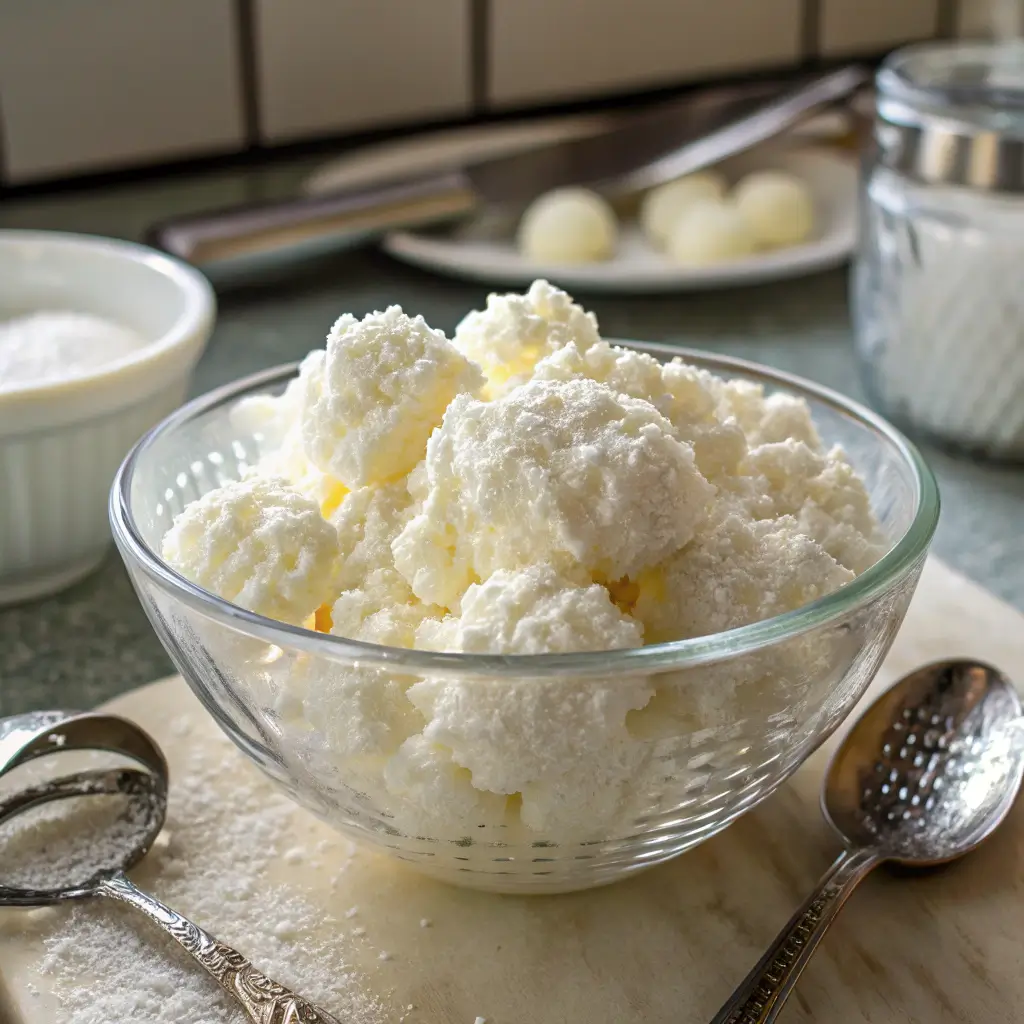
Cottage cheese is a creamy, protein-packed favorite for everything from breakfast bowls to post-workout snacks. But what happens when you have a tub nearing its expiration date and you’re not ready to toss it? You’ve probably asked, “Can you freeze cottage cheese?” or “Does cottage cheese freeze well?” These questions are common — and the answer depends on how you plan to use it.
While fresh cottage cheese has a smooth, luscious texture, freezing cottage cheese can alter its consistency, making it grainier and more watery once thawed. Still, it’s a practical option for extending shelf life — especially if you’re using it in cooked or blended dishes.
Table of Contents
Table of Contents
Understanding the Basics of Freezing Cottage Cheese
What Is Cottage Cheese and Why It’s So Popular
Cottage cheese is a fresh cheese made from the curds of cow’s milk. It’s known for its slightly tangy flavor, lumpy texture, and high protein content. Popular among athletes, dieters, and health-conscious eaters, it fits into keto, low-carb, and high-protein meal plans.
Its low fat, high calcium, and versatility make it an everyday fridge staple. You’ll find it in salads, dips, pancakes, and even desserts. But because it’s a perishable dairy product, shelf life is a concern—hence the big question: can it be frozen?
Can You Freeze Cottage Cheese? A Straight Answer
Yes, you can freeze cottage cheese, but should you? That depends on how you plan to use it. Freezing cottage cheese affects its texture and may slightly alter its taste. If you’re planning to eat it straight from the tub, you might be disappointed. But if you’re using it in cooked dishes like lasagna or baked goods, freezing can work well.
When you freeze cottage cheese, the curds and whey tend to separate, resulting in a watery or grainy texture once thawed. However, can i freeze cottage cheese for meal prep? Absolutely, if texture isn’t your top priority. In fact, freeze cottage cheese is a great trick for minimizing waste if done correctly.
Check out homemade cottage cheese if you’re curious about DIY options that freeze better than store-bought brands.
What Happens When You Freeze Cottage Cheese
Texture Changes: What to Expect After Thawing
When you freeze cottage cheese, the first noticeable change after thawing is its texture. The separation of curds and whey becomes more pronounced. Instead of a smooth, creamy feel, thawed cottage cheese often turns watery, grainy, or crumbly. This happens because the water content expands during freezing and breaks down the protein structure.
Does cottage cheese freeze well for spreading on toast or topping fruit? Not quite. Its altered texture means it’s better suited for recipes where it’s blended or baked.
The key takeaway? If you’re particular about texture, can you freeze cottage cheese becomes more of a “yes, but…” answer.

How Does Freezing Affect the Flavor?
While freezing doesn’t drastically change the flavor, it can dull the creaminess and slightly sour edge that fresh cottage cheese is known for. Some brands may taste blander after freezing, especially low-fat versions that already have less richness.
If you accidentally freeze cottage cheese, don’t panic—it’s still safe to eat. The taste just might not be as vibrant. To preserve more flavor, freeze it as fresh as possible and avoid long storage.
Don’t miss our cottage cheese keto diet guide if you’re looking to incorporate frozen options into your low-carb meal planning.
Pros and Cons of Freezing Cottage Cheese
Benefits of Freezing: Convenience & Shelf Life
Freezing cottage cheese has a few standout benefits:
- Reduces waste: Great for bulk buyers or meal preppers.
- Extends shelf life: From a few days in the fridge to several months in the freezer.
- Perfect for cooking: Frozen cottage cheese is great in baked dishes and casseroles.
So, can i freeze cottage cheese to use later in recipes? Yes, especially if you don’t mind the change in texture.
For busy households and budget-conscious cooks, these perks can outweigh the drawbacks.
Downsides: Taste, Texture, and Quality Loss
On the downside:
- Texture gets watery and crumbly
- Flavor might dull slightly
- Not ideal for raw consumption
- Fat separation occurs in full-fat versions
Despite these issues, freeze cottage cheese remains a practical option when you’re planning to cook with it. If you’ve ever wondered, “does cottage cheese freeze well enough for lasagna?” the answer is a resounding yes.
Discover great ideas like cottage cheese salad for dishes that taste best when fresh—not frozen.
How to Properly Freeze Cottage Cheese
Step-by-Step Guide to Freezing Cottage Cheese
Freezing cottage cheese is simple if done the right way. Here’s how to get the best results:
- Use it fresh: Freeze the cottage cheese as soon as you buy it—don’t wait until it’s near expiry.
- Portion it: Divide into small amounts using freezer-safe containers or zip-top bags.
- Label it: Mark the container with the date. Frozen cottage cheese lasts up to 3 months.
- Remove air: For bagged portions, press out excess air to prevent freezer burn.
- Seal tight: Ensure the container is airtight to maintain flavor.
Bonus tip: Stir well before freezing for more even consistency later.
Best Containers and Tools for Freezing Success
To freeze cottage cheese effectively, choose:
- BPA-free plastic containers with tight lids
- Silicone freezer trays for small portions
- Vacuum-sealed bags (for long-term storage)
Avoid glass jars (they may crack) and large containers where cottage cheese may thaw unevenly. For better results, always label and rotate your stock—first in, first out.
Looking for inspiration? Try lactose-free cottage cheese if you’re managing dietary needs and freezing options.
Thawing Frozen Cottage Cheese the Right Way
Safe Thawing Techniques You Should Follow
The safest way to thaw cottage cheese is in the refrigerator. Let it sit overnight to reduce the risk of bacterial growth. Avoid microwaving—it creates hot spots and messes with texture even more.
Here’s a quick thawing guide:
| Method | Time | Notes |
|---|---|---|
| Refrigerator | 12–24 hours | Best method for texture |
| Cold water bath | 2–3 hours | Change water every 30 minutes |
| Microwave | Not recommended | Texture may degrade |
Once thawed, use within 3–5 days and never refreeze. That goes for any dairy product.
Can You Cook With Thawed Cottage Cheese?
Yes, and that’s actually the best use for it. Once thawed, cottage cheese shines in:
- Lasagnas
- Pasta bakes
- Muffins
- Protein pancakes
- Cheesecakes
Since the texture has already changed, incorporating it into batter or sauces is a smart move.
Want to label smarter? Learn more about cottage cheese labels and how they indicate freeze-by or use-by timelines.
Tips to Maintain Taste and Texture When Freezing
Pre-Freezing Prep Tips That Help
Getting better results from freezing starts with preparation. Before you toss that tub into the freezer, here’s what to do:
- Drain excess liquid: Too much moisture can cause more separation.
- Mix well: Stir thoroughly to evenly distribute curds and whey.
- Freeze in small batches: Smaller portions thaw more evenly and prevent waste.
- Add a stabilizer: A pinch of cornstarch or cream before freezing can help keep the texture creamier.
Freezing cottage cheese right out of the store? That’s fine. But prepping it beforehand ensures it still works well in recipes later.
Mixing and Stirring After Thawing
Once you thaw cottage cheese, you’ll likely see water pooling on the top. Don’t worry—that’s normal.
Here’s how to fix it:
- Drain the excess liquid, or
- Stir thoroughly to reincorporate the whey
In some cases, blending it for a few seconds can restore a more uniform consistency, especially if you’re using it for dips, smoothies, or baking.
Myths About Freezing Cottage Cheese
“Cottage Cheese Should Never Be Frozen” – True or False?
This myth is only half true. Freezing cottage cheese isn’t ideal if you plan to eat it fresh. But if you’re using it in cooked dishes, freezing is not only possible—it’s practical.
Myth: “It becomes inedible.”
Truth: It becomes different in texture, but still usable and safe.
Myth: “You’ll get sick.”
Truth: As long as it’s frozen and thawed safely, there’s no added risk.
So next time you ask, “can you freeze cottage cheese?” remember—it depends on your purpose.
Comparing Freezing Cottage Cheese vs Other Dairy Products
Here’s how cottage cheese stacks up to other common frozen dairy:
| Product | Freezing Suitability | Texture After Thaw |
|---|---|---|
| Cottage Cheese | Medium | Watery, curdled |
| Cream Cheese | Low | Grainy, separates |
| Ricotta Cheese | High | Similar to cottage cheese |
| Hard Cheese | High | Slight texture loss, still sliceable |
Compared to cream cheese or yogurt, cottage cheese holds up reasonably well—especially for baked dishes.

FAQs
Why does it say not to freeze cottage cheese?
Most containers advise against freezing due to the texture changes. Cottage cheese loses its creaminess and becomes watery and grainy when thawed. This makes it less enjoyable for fresh use but still safe and usable in cooking.
Can freezing cottage cheese affect its flavor?
Yes, it can dull the tangy, fresh flavor of cottage cheese. Some people notice a flat or sour taste after thawing. For best flavor, freeze cottage cheese at peak freshness and use it within 2–3 months.
What happens if you accidentally freeze cottage cheese?
If you accidentally froze it, don’t worry—it’s still safe to eat. Thaw it in the fridge and stir before using. It might not be great on toast, but it’s still perfect in pancakes or lasagna.
Why is freezing not recommended for cheese?
Freezing alters the fat and moisture structure of most cheeses. Soft and fresh cheeses like cottage cheese or ricotta are particularly prone to texture breakdown. Hard cheeses like cheddar freeze better and retain more of their original quality.
Want more healthy recipe inspiration and nutrition tips? Follow us on Facebook for daily meal ideas, expert advice, and delicious ways to incorporate both cottage cheese and Greek yogurt into your healthy lifestyle!
